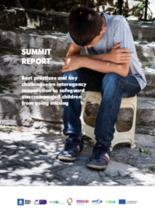Displaying 121 - 130 of 152
The aim of this event is to draw on lived-experience to inform the development of sensitive and inclusive safeguarding practices that respond appropriately to the diverse needs of children who live with parents who have mental health problems.
Compared to children in other placements, there is much less known about the characteristics and needs of children in the UK who are returned to their birth parents with a care order still in place.
The aim of this component of a preliminary cross-national study (Ireland and Catalonia) of care leavers' experience in the world of work is to explore how carers may influence the entry of young people in care into the world of work and how they may also influence the young people's progress in that world.
The aim of this component of a preliminary cross-national study (Ireland and Catalonia) of care leavers' experience in the world of work is to explore how carers may influence the entry of young people in care into the world of work and how they may also influence the young people's progress in that world.
This paper presents selectively on the findings of two separate but related qualitative Irish studies exploring relationship-based approaches in residential child care practice, from the perspectives of both residential child care workers and young care leavers.
A recent report by Ulster University Professor Patricia Lundy (in consultation with an expert panel on redress) advised that payments should be awarded to any former child residents of Northern Ireland institutions, irrespective of whether they suffered harm from sexual, physical or emotional violence.
This country care review includes the care-related Concluding Observations adopted by the Committee on the Rights of the Child.
This article highlights how inter-generational practices of love, care and solidarity are central to the negotiation of belonging in the settlement country.
The objective of the project is to reduce the numbers of unaccompanied children who go missing. This project addresses how the issue of the disappearance of an unaccompanied child is tackled in different Member States and promotes promising strategies and behaviours related to the prevention and response to disappearances.
According to Ireland's Child and Family Agency, Tusla, ten Irish children remained in care placements overseas as of late December 2015. All ten of the children were placed in facilities in Britain.


